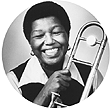"Melba Liston is one of the best jazz musicians, not just one of the best women in jazz." -- Junior Mance
Melba Liston
was
born on January 13, 1926, in Kansas
City, MO. She
made a reputation as an important jazz arranger, no small achievement in a
field generally dominated by men. Much of her most important work was
written for the pianist Randy Weston, with whom she worked for four decades
from the early 60s.
Weston valued Liston's contributions to his recordings and concerts
immensely, both for what he described as "the beauty, depth and sensitivity
of her arrangements" and for her ability "to adapt to any situation, whether
it's a chorus, or strings, or horns, or Africa."
She added creative layers of harmonic color and texture to Weston's
memorable themes, a combination which proved highly effective from his great
60s albums like High Life and Uhuru Afrika through to recent recordings like
Earth Birth (with Liston's string arrangements) and last year's Khepera.
She was born Melba Doretta Liston in Kansas City, but moved with her family
to Los Angeles in 1937, where she played in a youth bands in high school
before beginning her professional career working as a trombonist in a pit
band in 1942. She began to write arrangements from that time, and joined the
big band led by Gerald Wilson the following year.
She began to work with the emerging major names of the bebop scene in
mid-decade. She recorded with saxophonist Dexter Gordon in 1947, and was the
dedicatee of his tune "Mischievous Lady", and joined Dizzy Gillespie's big
band in New York for a time, when Wilson disbanded his orchestra on the east
coast after a tour.
She also toured with Billie Holiday in 1949, but decided in the early 50s
that the rigors and privations of the touring circuit were not for her. She
took a clerical job for some years, and supplemented her income by taking
work as an extra in Hollywood, including appearances in The Prodigal and The
Ten Commandments.
Gillespie invited her to re-join his big band when the State Department
funded tours to Europe, the Middle East and Latin America in 1956 and 1957,
and took what is her best known recorded trombone solo on Gillespie's tune
"Cool Breeze" on the album Dizzy Gillespie at Newport, recorded at the
Newport Jazz Festival in 1957.
She formed her own all-women quintet in 1958. She toured Europe with the
theatre production Free and Easy in 1959, then worked for a time in the band
led by the show's musical director, Quincy Jones. She worked with a variety
of leaders in the 60s, including vibraphonist Milt Jackson and saxophonist
Johnny Griffin, and began her long association with Weston. In 1973, she
began a six-year teaching appointment at the Jamaica School of Music, and
formed her own mixed band, Melba Liston and Company, after her return to the
USA in 1979.
She was forced to give up playing in 1985 after a stroke left her partially
paralyzed, but she continued to arrange music with Weston, contributing her
imaginative, often strikingly dramatic arrangements to a succession of his
albums in the 90s. She was afflicted by a further series of strokes in
recent years, which eventually proved fatal.




